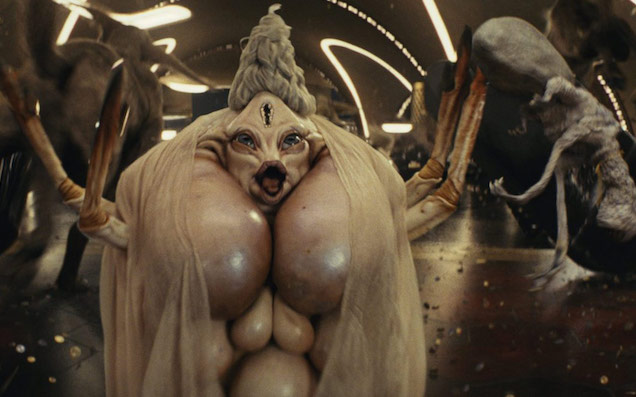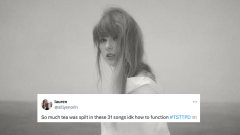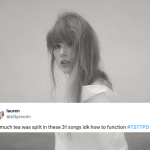
It is perfectly fine not to like a movie, I think we all understand that. Lots of people don’t like movies all the time. Lots of factors influence whether or not you will enjoy a movie: your taste, your life experience, your mood, the circumstances you saw it in, your arbitrary and difficult to articulate grudges against specific actors (fuck you, John Leguizamo). A lot of people arrived at the conclusion that they did not like The Last Jedi, which is fine, but a lot of those people became very deeply weird about it. They started petitions to have it removed from the canon. They edited out all the footage that made women look cool or useful. They started campaigns to try and remake the movie, campaigns that, shockingly, went absolutely nowhere.
[jwplayer gvkTjsCy]
While this sort of nonsense is obviously kinda bonkers, it seemed like a natural product of a combination of nerd entitlement, a tradition of only white men doing important things in movies, and the Reddit / 4chan culture of losing your entire mind any time anything appears to be adjacent to those perfidious SJWs. At least one person is arguing that there’s something more to it, in a paper published under the name Weaponizing the haters: The Last Jedi and the strategic politicization of pop culture through social media manipulation.
In the paper, Morten Bay (a name that Brisbanites will find at least somewhat funny) from the University of California, Los Angeles argues that a portion of the hate came from “bots, trolls/sock puppets or political activists”, a number of which were “Russian trolls“, all in the service of “propagating a narrative of widespread discord and dysfunction in American society“. It’s a lot.
Bay’s study specifically looked at tweets directed at TLJ director Rian Johnson‘s Twitter account over a period of seven months following the film’s release. The tweets were then pared down by removing GIFs and memes and by consolidating multiple tweets from individual users down to one tweet that acted as an exemplar of their sentiment towards the film and its director. From there, Bay performed a ‘manual sentiment analysis’, ie looked at the tweet and the user to determine if the response was positive, negative, or neutral. In the paper, Bay says he did it manually (instead of using algorithmic analysis) because doing it yourself gives you a better ability “to detect satire or sarcasm“. Makes sense.
Bay’s examples of what constitutes a negative tweet are utterly divine:
An example of a negative tweet: “@rianjohnson your movie is the worst. I hate you for ruining Star Wars.#kathleenkennedy #RianJohnson #TheLastJedi #starwars #thelastjediawful”. Other negative tweets included phrases such as “You ruined Star Wars”, “Please don’t make anymore Star Wars movies” and tweets calling the film a “travesty”, “dumb”, “terrible”, “career-endingly bad”, “abhorrent” and “awful”. Other users stated that Rian Johnson had committed a “war crime” or should “be in jail”.
A lot of the work came from determining whether a tweet in the negative category was coming from someone “simply sufficiently dissatisfied with the film that they felt the need to express this directly to the director” (lol) or someone who “had a different, politically-motivated agenda driving their negativity“. Bay divided the negative reactions into three categories: “Political agenda, Troll/Sock Puppets/bots and Real fantagonists“. (Bay described ‘fantagonists’ as being genuine Star Wars fans upset with the movie for non-political reasons.)
By his count, 50.9% of the negative tweets were from people that were “politically motivated or not even human“. Bay posited that 33 of those people were “trolls and/or sock puppets“, furthering concluding that “16 of these 33 troll/sock puppet accounts appear to be Russian trolls, or at least possess several of the Russian troll characteristics presented above“.
At this point, you might be asking why Russia would be involved in this at all. Bay argues that (and cites a few studies in support of this conclusion) the Russian interference MO is to exploit ‘cognitive dissonance’ to “persuade individual social media users that their values are under attack, cultivating and advancing polarization and disparity“. This is supposedly done to undermine America’s “sense of community“.
Bay explains the cognitive dissonance he’s referring to as thus:
The perceived politics of The Last Jedi are in conflict with some fans’ perception of Star Wars as family entertainment devoid of politics, which was never the case. The realization that Star Wars takes up a position that is left-of-center, seems to have created much dissonance in the minds of some fans of with a right-of-center political orientation. . . . A number of fans feel like Star Wars has been politicized by Lucasfilm and Disney, but since the political and ethical positions presented in the new films are consistent with older films, it is more likely that the polarization of the Trump era has politicized the fans.
As an example of the existing politicisation of the franchise, Bay points to Lucas’ own description of the series as being intended as an allegory for the Vietnam War, with the rebels representing the South Vietnamese and the Empire standing in for the US.
Bay himself points out that it’s almost impossible to say with certainty whether or not someone is actually a Russian troll of some kind, just that the accounts he picked out strongly match the indicators arrived at from large datasets about their behaviour. Either way, this is weird as hell.
A bit of Morten’s research came out awhile ago and made some headlines – here’s his full paper. Looking forward to reading it, but what the top-line describes is consistent with my experience online. https://t.co/MTRgmPxGgZ
— Rian Johnson (@rianjohnson) October 1, 2018







